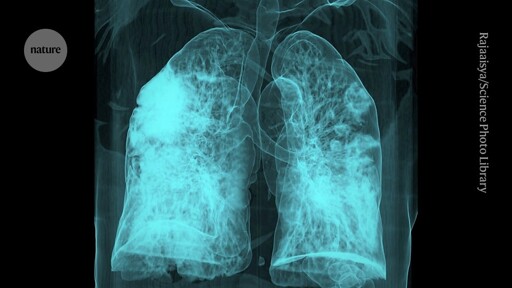Article text below
Hidden in the lungs of some breast cancer survivors are tumour cells that can remain dormant for decades — until they one day trigger a relapse. Now, experiments in mice show that these rogue cells can be roused from their slumber by common respiratory illnesses such as COVID-19 or the flu. The findings, published in Nature on 30 July1, seem to extend to humans too: data from thousands of people show that infection with the SARS-CoV-2 coronavirus is linked with a nearly twofold increase in cancer-related death, possibly helping to explain why cancer death rates increased early during the COVID-19 pandemic.
The results are “really quite dramatic”, says James DeGregori, a cancer biologist at the University of Colorado School of Medicine in Aurora, and an author of the study. “Respiratory virus infections didn’t just awaken the cells,” he says, they also caused them to proliferate, or multiply, “to enormous numbers”.
Reasons for waking up
Researchers have spotted dormant cancer cells, which detached from the initial tumour, hiding in tissues such as bone marrow in people in remission from breast, prostate and skin cancer, among others. These cells, a precursor to metastasis — which is the spread to distant organs — pose a problem, even in survivors of these cancers. For instance, in about one-quarter of breast cancer survivors, such cells can trigger a relapse and metastasize.
Scientists have long been trying to uncover what triggers these cells to reawaken. Previous work has hinted at chronic inflammation as a culprit, such as that caused by smoking cigarettes2 and ageing3.
DeGregori and his colleagues wondered whether acute inflammation caused by a respiratory infection could also reactivate dormant cancer cells. To test this, the researchers genetically engineered mice to develop breast tumours similar to those in humans and to seed dormant tumour cells into other tissues including the lungs. Then, they infected the animals with either SARS-CoV-2 or influenza. Within days of infection, dormant cancer cells in the lungs of the mice kicked into high gear, proliferated and formed metastatic lesions. But it wasn’t the pathogens directly that caused this to happen, the researchers learnt: it was a key immune molecule called interleukin-6 (IL-6), which helps to rev up the body’s response to foreign threats. They confirmed this by engineering mice to lack IL-6. In these animals, the dormant cancer cells did not multiply nearly as quickly.
About two weeks after the researchers infected the mice, the cells fell dormant again. This means that the infections do not directly cause cancer, but make it more likely that a future threat, whether it’s an infection or a genetic mutation, could cause the cancer to become active again, DeGregori says. He likens the process to starting a fire a few times. “You’ve awakened the flames and then it dies back down,” he says. “But now you’ve got 100 times the embers that you had before” — making it easier to turn into an inferno.
Even so, that’s not the end of the story. The researchers observed that, although IL-6 was essential to awakening the cancer cells, another key immune player called a helper T cell shielded the cancer cells from other immune-system defences. “Seeing that these cancer cells were perverting the immune system to protect them as opposed to eliminate them was really quite shocking,” DeGregori says. Population data in large repositories such as the UK Biobank helped to corroborate the study’s findings in people: the increased risk of cancer-related death in those who tested positive for COVID-19 was most pronounced in the months immediately following infection, mirroring the rapid proliferation of reawakened cancer cells observed in the mice.
Viruses and chronic disease
The results add to the growing body of work that has linked chronic inflammation caused by pathogens to seemingly unrelated health conditions. For instance, infection with the common Epstein–Barr virus raises the risk of developing multiple sclerosis. But this is the first study to demonstrate a link between the acute inflammation caused by pathogens and cancer, says Akiko Iwasaki, an immunologist at Yale School of Medicine in New Haven, Connecticut.
Mikala Egeblad, a cancer biologist at Johns Hopkins School of Medicine in Baltimore, Maryland. For example, physicians have used treatments aimed at IL-6 to tamp down inflammation in people with severe COVID-19. Future research should investigate the effectiveness of such drugs in preventing cancer recurrence, she says.
Until scientists have more answers, cancer survivors are recommended to take extra precautions to avoid respiratory infections and consider vaccination against pathogens such as SARS-CoV-2 and flu virus, DeGregori says.
He and his colleagues plan to next study whether the findings extend to other cancer types, tissues outside of the lungs and other common pathogens.
common respiratory illnesses such as COVID-19
I guess people just have a will to normalize a permanent plague but honestly it’s staggering that this is where we’re at 5-6 years after it first started. Just so bleak.
Oh cool oh good oh great. More horrors.

The horrors will continue until the proletariat is forced into sterile chambers where they are all assigned an email job and fed via a tube.
oh great… just as I came home early from work because I have a wicked sore throat even after taking 2 ibuprofen pills to try to curb it… i’m betting its the new covid but all our tests are expired so I can’t exactly trust that my negative results are accurate







